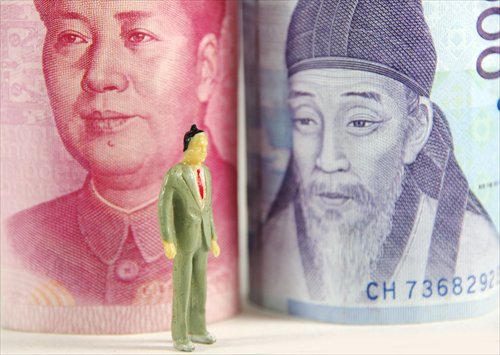China, S.Korea boost financial ties
Countries to increase cooperation on bonds, capital markets

Photo: CFP
China is seeking to strengthen economic ties with South Korea by encouraging further cooperation in the financial and trade sectors, analysts noted Sunday.
The People's Bank of China (PBC), the country's central bank, has allowed South Korea to issue yuan-denominated sovereign bonds in China's debt market as part of financial cooperation between two countries, the PBC announced over the weekend.
China and South Korea have also reached an agreement on direct trading between the Korean won and Chinese yuan via the China Foreign Exchange Trade System (CFETS) in the near future, the PBC said Saturday. It was as part of a financial pact signed during Chinese Premier Li Keqiang's three-day visit to South Korea from Saturday October 31 to Monday November 2.
Also, the Korean government said it will encourage Chinese institutions to issue bonds in South Korea, hoping to develop the bond market in both countries while promoting the yuan's globalization.
In order to expand the Renminbi Qualified Foreign Institutional Investor (RQFII) quota in South Korea, China's central bank on Saturday also decided to increase the quota ceiling to 120 billion yuan ($19.0 billion), from the current 80 billion yuan. The RQFII is an initiative to allow foreign investors to invest in the Chinese mainland capital market.
Increasing the RQFII quota and encouraging the issuance of yuan-denominated bonds shows that China is accelerating the opening up of its capital market to South Korea, which attracts tourists as well as investors and companies from China, Dong Dengxin, director of the Financial Securities Institute at Wuhan University of Science and Technology, told the Global Times Sunday.
"As China and South Korea have a strong connection in both the trade and foreign investment sectors, facilitating access to capital markets and building up a direct currency trading mechanism via the CFETS are expected to strengthen the partnership between the two countries," Dong said.
From July to September, the daily average of won-yuan trading in South Korea declined to $2.19 billion, down about 29 percent from the previous quarter, which had a big impact on South Korea's daily foreign exchange transactions, the country's Yonhap News Agency reported in October, citing data from the Bank of Korea.
In June, 12 Korean banks had been picked to expand South Korea's won-yuan direct transaction market, as the daily won-yuan transaction volume reached $3.3 billion in May, accounting for about 38 percent of the won-dollar trade volume, according to Yonhap.
Shi Yuanhua, a South Korean studies expert at Fudan University, echoed Dong's view. He noted that expanding cooperation in capital markets is expected to boost trade and investment between the two countries.
"Further financial cooperation between China and South Korea is going to help reduce the financing costs as well as exchange risks for Chinese enterprises investing in South Korea," Shi told the Global Times Sunday.
China remains the largest trading partner for South Korea, with its total exports to China worth $102 billion by the end of September in 2015, according to the website of the Korea Customs Service.
South Korea and China have reached an agreement on exports of Korean ginseng chicken soup to China, while making efforts to pave the way for South Korea to export Korean kimchi to China in the near future, according an announcement published on the Chinese government's website Sunday.
Still, China's economic slowdown has affected the trade volume between the two countries, as South Korea's exports to and imports from China in September declined by 5 percent and 0.6 percent year-on-year, respectively, data from the Korea Customs Service showed.
Dong noted that South Korea is one of the major destinations for China's capital outflows, and an increasing number of Chinese enterprises will invest in South Korea under China's "One Belt, One Road" initiative.
The PBC also noted that both countries had agreed to expand the pilot program in Qingdao, East China's Shandong Province that allows local companies to avail of lower rates by borrowing yuan-denominated funds from South Korean banks, with the program set to become available throughout Shandong Province.
The move is expected to lower financing costs for Chinese companies while helping foreign institutions to better manage their yuan-denominated assets, according to the PBC.
Meanwhile, China and South Korea are considering launching a pilot crowdfunding program in Shandong, targeting closer connections with the KOSDAQ, a South Korean trading board for start-ups and tech firms, according to the PBC.